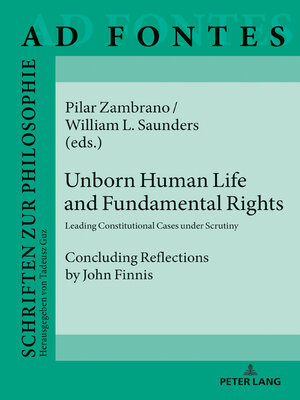Unborn Human Life and Fundamental Rights
ebook ∣ Leading Constitutional Cases under Scrutiny. Concluding Reflections by John Finnis · Ad Fontes
By Pilar Zambrano

Sign up to save your library
With an OverDrive account, you can save your favorite libraries for at-a-glance information about availability. Find out more about OverDrive accounts.
Find this title in Libby, the library reading app by OverDrive.



Search for a digital library with this title
Title found at these libraries:
| Loading... |
This book presents a collection of studies by top scholars on leading cases from twelve different jurisdictions defining the legal status of unborn human life. The cases under study pertain to three distinctive cultural and constitutional systems: Latin American Constitutional Courts and the Inter-American Court of Human Rights, European Constitutional Courts and the European Court on Human Rights, as well as Common Law jurisdictions. With a special conclusion by Professor John Finnis, drawing together the many treads of the individual chapters into a comprehensive whole, this book lays the basis for further comparative study of the legal and moral reasoning underlying judicial decisions which either recognize or deny legal personhood and/or equal dignity to unborn human beings.
Robert P. George McCormick, Professor of Jurisprudence and Director of the James Madison Program in American Ideals and Institutions, Princeton University:
"Pilar Zambrano and William L. Saunders have done a great service by giving us a thorough compilation of the law of various jurisdictions concerning the status and rights of the unborn. They have brought together an impressive group of scholars and obtained from them work of the highest intellectual caliber."
Prof. Carlos Massini-Correas, University of Mendoza and University of Buenos Aires:
"In undertaking the very unusual task of analyzing both the legal and the moral horizon of interpretation underlying leading judicial decisions, this book represents an exceptional shortcut to the bulk of constitutional and philosophical arguments in favor of the enhancement of the value of unborn human life to the status of a right. This mixed perspective of study allows us to avoid the usual fallacy of both sides of the abortion debate, to overlook either its moral or its legal framework."






